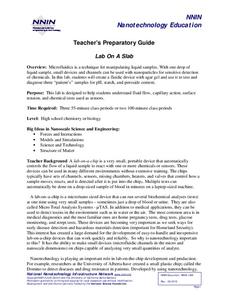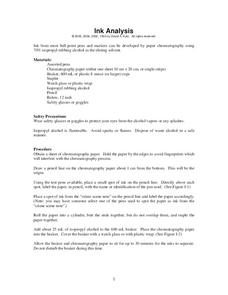Teach Engineering
Exploring Capillary Action
Explore capillary action from different perspectives. In the fourth installment of a nine-part series, scholars perform several experiments to observe capillary action. They look at the meniscus of water in a glass, observe capillary...
Virginia Department of Education
Physical and Chemical Properties of Water
How can you effectively provide detailed concepts of water properties to your high school class in a way they find exciting and challenging at the same time? By letting them play, of course! Through a variety of experiments, pupils...
Olomana School
Mixtures and Solutions: Paper Chromatography Experiment
Why does some ink bleed through paper, and other ink doesn't? Practice some paper chromatography to separate the colors from a pen with an interactive experiment for middle and high schoolers. Learners use a variety of solutions to track...
National Nanotechnology Infrastructure Network
Lab On A Slab
Capillary action is the frugal chemist's dream ... the less liquid used, the more tests they can run! Learners experiment with the best design to maximize the benefits of capillary action. Using a liquid sample, they design a capillary...
Teach Engineering
Measuring Surface Tension
How do you measure surface tension? The fifth installment of a nine-part series is an experiment where young scientists use tubes of different sizes to measure surface tension. They calculate the average and standard deviation of the...
Scholastic
Spring Is Sprung: Water Movement in Plants
Young scientists use food coloring and celery stalks to determine how water travels through plants.
Curated OER
Ink Analysis
High school chemistry class members become "detectives for a day" and use the concept of paper chromatography to analyze a note left at the scene of a crime. Pupils test the ink on the note with a solvent, such as isopropyl alcohol, to...








